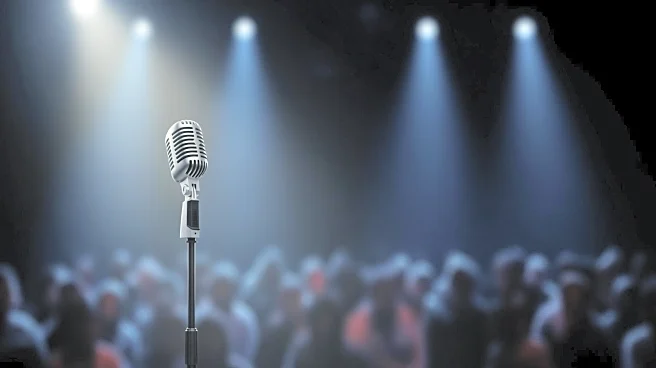What's Happening?
Comedian Marc Maron recently made headlines following a candid confession during an Esquire interview on October 16, 2025. Maron, known for his long-running podcast 'WTF with Marc Maron,' which recently concluded
after nearly 1,700 episodes, admitted to feelings of jealousy in a past rivalry. This admission quickly gained traction, with Variety and other outlets covering the story extensively. The confession has prompted a broader discussion within the comedy and podcasting communities about the appropriateness of airing personal grievances publicly. The remark, described as brutally honest, has been widely shared and debated across social media platforms, highlighting the tension between personal transparency and professional decorum.
Why It's Important?
Maron's admission is significant as it challenges the norms of accountability and transparency in the entertainment industry. The rapid spread of his confession underscores the power of social media in shaping public discourse and influencing industry practices. For comedians and podcasters, this incident raises questions about the impact of personal revelations on professional opportunities, such as festival bookings and panel appearances. The debate also touches on the broader cultural shift towards valuing authenticity and vulnerability, which can either enhance or damage reputations depending on public perception. Industry stakeholders, including bookers and festival organizers, may need to reconsider how they evaluate potential participants, balancing the appeal of candidness with the risk of controversy.
What's Next?
The fallout from Maron's confession may lead to changes in how comedians and podcasters approach public disclosures. Industry players might become more cautious about airing personal grievances, while audiences could become more discerning about the authenticity of such admissions. Festival organizers and bookers may start to prioritize transparency and honesty as desirable traits, potentially reshaping the landscape of comedy and podcasting. Additionally, this incident could inspire other entertainers to reflect on their own public personas and the role of personal admissions in their careers.
Beyond the Headlines
This development highlights the evolving nature of accountability culture within the entertainment industry. As public figures navigate the fine line between personal expression and professional responsibility, the incident serves as a case study in the potential consequences of transparency. The discussion also reflects broader societal trends towards valuing openness and vulnerability, which can redefine public expectations of entertainers. This shift may lead to a reevaluation of what constitutes acceptable behavior in the public eye, influencing future industry standards and practices.









